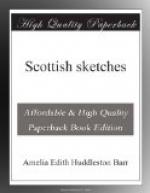“Why did ye na mak me do right, Tallisker? You should hae been mair determined wi’ me, dominie.”
During the next six weeks the dominie’s efforts were almost superhuman. He saw every cottage whitewashed; he was nurse and doctor and cook. The laird saw him carrying wailing babies and holding raving men in his strong arms. He watched over the sick till the last ray of hope fled; he buried them tenderly when all was over. The splendor of the man’s humanity had never shown itself until it stood erect and feared not, while the pestilence that walked in darkness and the destruction that wasted at noon-day dogged his every step.
The laird, too, tried to do his duty. Plenty of people are willing to play the Samaritan without the oil and the twopence, but that was not Crawford’s way. Tallisker’s outspoken blame had really made him tremble at his new responsibilities; he had put his hand liberally in his pocket to aid the sufferers. Perhaps at the foundation of all lay one haunting thought—Helen! If he did what he could for others, Helen would safer. He never audibly admitted that Helen was in any danger, but—but—if there should be danger, he was, he hoped, paying a ransom for her safety.
In six weeks the epidemic appeared to have spent itself. There was a talk of resuming full hours at the works. Twenty new hands had been sent for to fill vacant places. Still there was a shadow on the dominie’s face, and he knew himself there was a shadow on his heart. Was it the still solemnity of death in which he had lately lived so much? Or was it the shadow of a coming instead of a departing sorrow?
One afternoon he thought he would go and sit with Helen a little while. During his close intimacy with the colliers he had learned many things which would change his methods of working for their welfare; and of these changes he wished to speak with Helen. She was just going for a walk on the moor, and he went with her. It was on such a September evening she had walked last with Colin. As they sauntered slowly, almost solemnly home, she remembered it. Some impulse far beyond her control or understanding urged her to say, “Dominie, when I am gone I leave Colin to you.”
He looked at her with a sudden enlightenment. Her face had for a moment a far-away death-like predestination over it. His heart sank like lead as he looked at her.
“Are you ill, Helen?”
“I have not been well for two weeks.”
He felt her hands; they were burning with fever.
“Let us go home,” she said, and then she turned and gave one long, mournful look at the mountains and the sea and the great stretch of moorland. Tallisker knew in his heart she was bidding farewell to them. He had no word to say. There are moods of the soul beyond all human intermeddling.
The silence was broken by Helen. She pointed to the mountains. “How steadfast they are, how familiar with forgotten years! How small we are beside them!”




